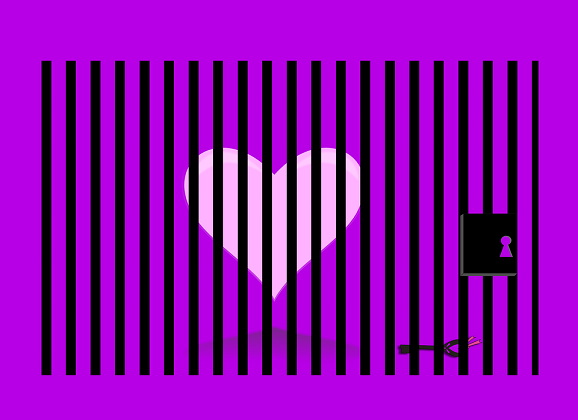Romantic Crush Syndrome
The problem with love is you can love who you want…but so can they. — Anonymous

If so, you may be suffering one of the greatest and most potent afflictions known to humankind:
The romantic crush.
THE QUALITIES OF A CRUSH
With the Christmas season already here, love is in the air—or at least on the airwaves as every channel from TBS to Lifetime fills our cable boxes with romantic comedies.

First, it’s important to define exactly what a crush is and how it’s different from other forms of romantic attraction (e.g., being in love). In general, there are two distinguishing characteristics to a crush:
(1) A crush is different from other feelings of attraction because the attraction isn’t reciprocated (or at least not yet). That is, to qualify as having a crush, you cannot have revealed your feelings to this other individual.
(2) The desires that a crush elicits cannot be filled by someone else. Whereas sexual attraction can be satisfied by any number of partners, a crush is unique in its exclusive craving for a single person.
And because of these features, research shows we’ll do some strange things to cope with our unrequited feelings…
CRAVING TO BE CRUSHED

In one study, researchers interviewed single people who either self-reported they did or did not currently have a crush on someone. Then, the researchers showed the participants a bunch of consumer products that varied in how much sensory stimulation they elicited (e.g., strong vs. weak flavored coffee).
Remarkably, the single individuals who reported having a crush selected a significantly greater proportion of items with greater sensory stimulation (i.e., things that would make them “feel” more like the strong flavored coffee).
In fact, this research showed that people who had a crush were even more likely to choose an iPad cover with a rough texture compared to a smooth one because of their implicit craving for physical stimulation!
I’LL FIND SOMETHING TO WORK
It’s not just more sensory satisfying activities that those with a crush crave. Additionally, research shows they seek out a greater variety of choices in their life.

Being uncertain about whether the relationship will ever materialize leads people to feel they don’t have as much control over their lives as they’d like. So, to compensate, they want the ability to make a variety of choices—as being “able to choose” can help restore a sense of control.
In one example of this phenomenon, researchers had participants either recall a crush they had (to put them in the “crush mindset”) or simply write about a typical day. Then, the researchers gave participants the option to choose up to four candies from five different flavors.
Interestingly, those in the crush mindset chose a greater variety of flavors than those in the control mindset. And in fact, this finding was replicated with yogurts (where those in a crush mindset were more likely to choose the variety pack compared to the single-flavor pack), snacks (those in a crush mindset chose a greater variety), and even hotels (those in a crush mindset wanted to move between hotels more).
CRUSHING IT
So, if you recognize you have a crush on someone, be aware of how it can influence your psychology! But, if you’d rather try to turn that crush into a romantic partner, consider checking out a previous post on how to make a psychological love potion ????
Crushingly,
jdt
Everyday Psychology: In a survey of close to 550 adolescents, 56% currently reported having a crush on someone. Could this preponderance of crushes help explain the crazy behaviors that teenagers regularly engage in? How might the influences of a crush differ as a function of a person’s age? Although the younger may be more hormone crazy, could a crush in older age be more meaningful? What do you think? Share your thoughts below!
Huang, X., & Dong, P. (2018). Romantic Crushes Promote Variety‐Seeking Behavior. Journal of Consumer Psychology.
Huang, X., Dong, P., & Zhang, M. (2018). Crush on you: Romantic crushes increase consumers’ preferences for strong sensory stimuli. Journal of Consumer Research.








This is super fascinating! Is there any research that indicates when this wears off? Is it at the point that the feelings are reciprocated, when a relationship is established? I find it interesting that even thinking about a crush from the past can bring back the impacts.
JBo! So good to hear from you 🙂 and I’m sorry for the delay in response. (I’ve been traveling back to Portland for winter break.) But first, I’m glad you found the post fascinating! I thought this research was really interesting, too. As for your questions, though, I unfortunately don’t have the answers. The research I reported on is some of the very first to examine “crushes” as they’ve been defined, so a lot of great thoughts like yours remain unanswered.
If I were to speculate, though, I think your own intuition is correct. If the crush reciprocates feelings, then that desire to touch them, be with them, etc. is diminished, and therefore you’d be less likely to compensate for your lack of connection through other means. Your question about when it might wear off (without having the feelings reciprocated) is a good one, too. I would imagine that interest in the other person strongly correlates with the desire for other sensory stimulation. That is, the more [less] you crave them, the more [less] you desire loud music, etc. This is why you can produce the same effects with recall: When that craving for another person simply gets “activated” (or even simulated), it cues the feelings relevant to the effects I described. Even still, this would be a question worthy of future empirical research!
Sorry for such a long winded response ha But thank you for reading and asking such terrific questions!
Thanks for your response! I know they are only speculations, but what you said makes a lot of sense. In the future, once there is more research, I’d love for you to do a follow up.
Posts like this are why I love reading your blog. My introduction to psychology left me feeling intrigued by the subject, but also overwhelmingly bored. Reading your blog I am exposed to just how interesting the discipline actually is and various ways it can be applied to all aspects of our lives. So thank you for that!
I hope you have a wonderful break at home!
I will definitely keep an eye out on future research related to this topic. The team of researchers who did this work will likely pursue it further, so hopefully they (and others) will keep the insight flowing!
And thank you for such kind words about the blog 🙂 It really warms my heart to hear that from you. I think there is a lot of great and applicable information we’ve learned from psychology, but the textbooks don’t always do a good job of conveying this.
I hope you, too, enjoy this holiday season!